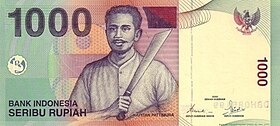Thomas Matulessy | |
|---|---|
 | |
| Nickname(s) | Pattimura |
| Born | 8 June 1783 Haria, Saparua, Maluku, Dutch East Indies |
| Died | 16 December 1817 (aged 34) Nieuw Victoria, Ambon, Maluku, Dutch East Indies |
| Allegiance | East India Company |
| Service | British Colonial Auxiliary Forces |
| Rank | Sergeant major |
| Battles / wars | Pattimura War |
| Awards | National Hero of Indonesia |
Thomas Matulessy (8 June 1783 – 16 December 1817), also known as Kapitan Pattimura or simply Pattimura, was a famous Ambonese soldier who became a symbol of both the Maluku and Indonesian struggle for independence, praised by President Sukarno and declared a national hero by President Suharto. He has several namesakes in both the Netherlands and in the Indonesian archipelago.
Born on the island of Ceram, Pattimura joined the British Colonial Auxiliary Forces after they took the Maluku islands from the French. When the islands were returned to the Dutch in 1816, he was dismissed. The return of the Dutch in 1816 marked a change in the colonial system. After the bankruptcy of the Dutch East India Company, the Indonesian archipelago came under the control of the newly founded Kingdom of the Netherlands. This was accompanied by, among other things, the establishment of a colonial army: KNIL. Christian Moluccans in particular were wanted as ethnic soldiers in the KNIL. Despite Pattimura's revolt, the myth of a centuries-long loyalty of Moluccans to the Netherlands and the royal family began.
Pattimura and his followers feared harsher colonial oppression than the English under whom he had served. On 16 May 1817, Pattimura led an armed rebellion that captured Fort Duurstede, killing the inhabitants of the fortress and fighting off Dutch reinforcements, on 29 May he was declared the leader of the Moluccan people. After being betrayed by the King of Booi Pati Akoon, he was captured by Dutch forces on 11 November and hanged the next month.